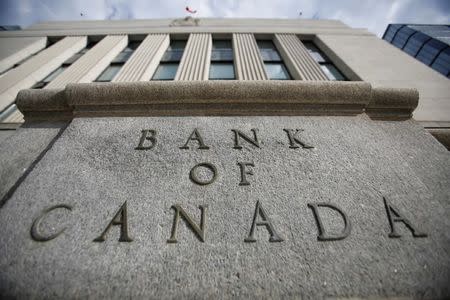Bank of Canada holds rates, sees no cooling in housing yet

By Andrea Hopkins and Leah Schnurr OTTAWA (Reuters) - The Bank of Canada held interest rates steady on Wednesday, as expected, saying that while economic growth was likely to moderate in the second quarter, government measures to rein in the housing market have not yet had a substantial effect. In a statement seen as less dovish than some had expected, the central bank said excess capacity remains in the economy and wage growth is subdued but noted strong spending by Canadians along with a housing boom and job growth. "Consumer spending and the housing sector continue to be robust on the back of an improving labor market, and these are becoming more broadly based across regions," the bank said in a statement accompanying the rate decision. While it kept the benchmark interest rate at 0.50 percent, as expected, economists said the statement's tone suggested a slight shift in stance toward eventual interest rate increases, which most market-watchers do not expect until 2018. "The one thing we picked up is they dropped the word 'material' when they talked about excess capacity. They used to talk about material excess capacity and now they just talk about excess capacity," said Doug Porter, chief economist at BMO Capital Markets. "We're slowly but surely moving toward the day when the bank might actually consider raising interest rates. I think that's still a long way down the road, but you've got to walk before you run," he added. The shift in tone helped boost the Canadian dollar, which touched C$1.3430 to the U.S. dollar, its strongest since April 24, but has since trimmed some gains to trade at C$1.3447 in late morning trade. The central bank also said recent measures taken in parts of Canada to rein in hot housing markets have not yet had "a substantial cooling effect." Fearful of a housing bubble, the federal government has tightened mortgage lending rules while provincial governments have imposed taxes on foreign buyers in Vancouver and Toronto. Bank of Canada Governor Stephen Poloz has previously said gains in home prices in those cities are unsustainable, and speculation was probably a factor. Household debt compared with income is at a record high. The bank said Canada's exporters still face "competitiveness challenges" and uncertainties remain but that recent indicators of business investment were encouraging. Poloz has said U.S. trade protectionism is the biggest cloud on the horizon for Canada, which sends some 75 percent of its exports to the United States. (Reporting by Andrea Hopkins and Leah Schnurr; Editing by Lisa Von Ahn and James Dalgleish)

